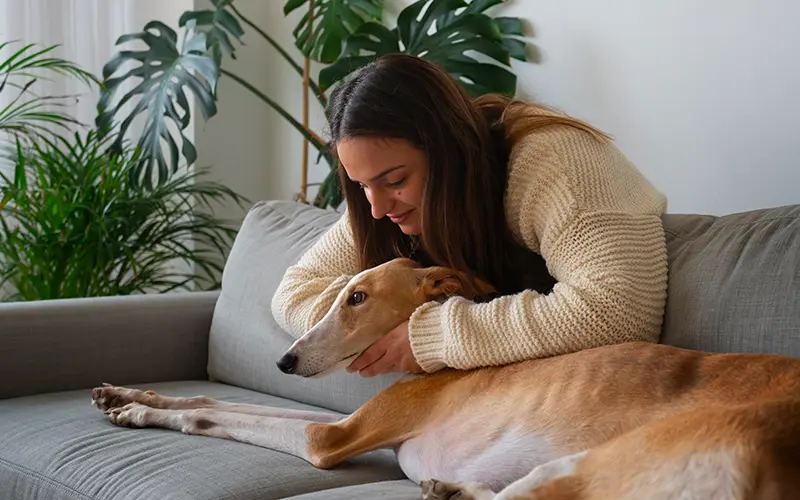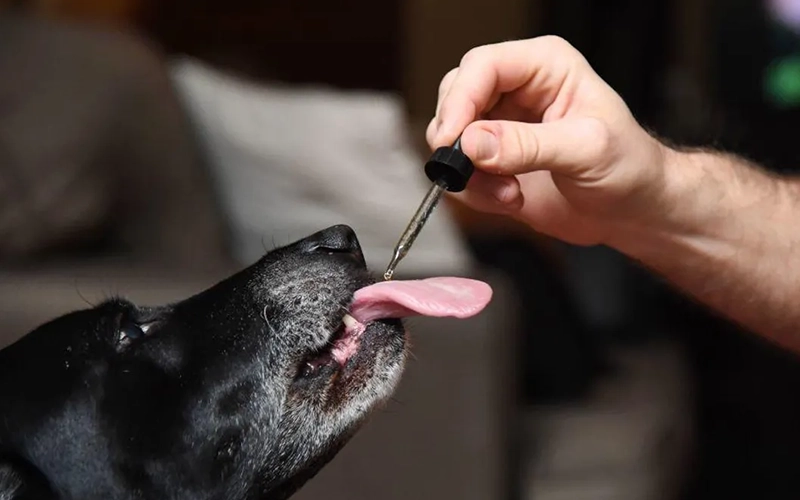

Some furry companions are trembling under the bed during a thunderstorm or pacing restlessly when their humans leave for work. Pet anxiety is a common problem, affecting millions of dogs and cats worldwide. It manifests in various ways, from excessive barking and destructive behavior to loss of appetite and hiding. While traditional treatments exist, many pet parents are turning to a natural alternative: CBD.
CBD, short for cannabidiol, is gaining popularity for its potential to soothe anxious pets and improve their overall well-being. This article explores the science behind CBD, its benefits for managing pet anxiety, and how to safely introduce it to a pet’s routine.
Table of Contents
ToggleAnxiety in pets is more than just a fleeting moment of worry. It’s a persistent state of fear or unease, that significantly impacts their quality of life. Just like humans, our furry companions experience anxiety, and it stems from a variety of causes.
Factors that contribute to pet anxiety are listed below.
Anxiety shows up in various ways, and it’s crucial to be attentive to a pet’s behavior. Some common signs include:
Untreated anxiety has a detrimental effect on a pet’s overall well-being. It leads to chronic stress, behavioral problems, and even physical health issues. Recognizing and addressing anxiety early on is vital to ensure a pet lives a happy and healthy life.

Just as with human CBD, the world of pet CBD products is a bit overwhelming. When a furry friend is struggling with anxiety, ensuring their safety and well-being is paramount. So, how to choose the right product? Let’s break it down.
Different forms of CBD offer unique advantages for managing anxiety:
When it comes to a pet’s health, don’t compromise. Always choose CBD products specifically formulated for animals. Some human CBD products contain ingredients that are harmful to a furry friend.
Navigating the CBD market is tricky for some. Look for the key indicators of a trustworthy product.
By being a discerning pet parent and prioritizing quality, pet parents help their anxious companions experience the full potential of CBD. Remember, it’s not just about choosing any product, it’s about choosing the right one for a pet’s unique needs and sensitivities.
The right CBD dosage for a pet depends on factors like their weight, the severity of their anxiety, and the product’s concentration. It’s crucial to start with a low dose and gradually increase it as needed, under the guidance of the pet’s attending veterinarian or a holistic veterinarian.
Just like with any medication or supplement, finding the right CBD dosage for a pet is crucial. It’s a balancing act that takes into account several factors:
When introducing CBD to a pet, it’s always best to start with a low dose and gradually increase it as needed. This allows pet parents to monitor their pet’s response and ensure their comfort and safety.
CBD is administered to pets in several ways.
Oral Administration
Topical Application
CBD creams or balms are applied directly to the skin for localized relief, particularly for anxiety-related skin issues or discomfort such as pruritus.
Transdermal Administration
CBD patches or rubbing CBD oil in a soft area of skin (e.g. inside of the ear flap) offer a slow and steady release of CBD, providing long-lasting effects.
Keep a close eye on the pet’s response to CBD. If pet parents notice any adverse side effects or if their anxiety doesn’t seem to be improving, consult the pet’s attending veterinarian for dosage adjustments or alternative options.
Remember, patience is key. Determining the perfect dosage and administration method for a pet takes some time. With careful observation and guidance from a veterinarian, pet parents help their furry companions experience the full benefits of CBD.

CBD offers a potential beacon of hope for pets grappling with anxiety. Its calming properties help ease stress and fear, making everyday challenges and anxiety-inducing events more manageable. Additionally, CBD’s anti-inflammatory action provide relief from discomfort associated with anxiety or other health conditions. For pets experiencing seizures, CBD also shows promise as a potential aid, although veterinary consultation is essential.
CBD has the potential to be a gentle whisper of peace for anxious pets. It helps to soothe their frazzled nerves and promote a sense of calm, making them less reactive to triggers and more comfortable in situations that once caused them distress.
“The combination of CBD and sertraline effectively reduces anxiety-like behaviors and normalizes gene expression alterations in an animal model of PTSD, suggesting potential for PTSD treatment in patients,” according to the 2021 study of Gasparyan, A., Navarrete, F., & Manzanares, J., titled “Cannabidiol and Sertraline Regulate Behavioral and Brain Gene Expression Alterations in an Animal Model of PTSD.”
Vet visits, thunderstorms, fireworks… these events are a nightmare for anxious pets. CBD offers a helping paw, easing their anxiety and allowing them to cope with these challenging situations more gracefully.
“A single dose of CBD-free distillate can significantly reduce canine stress during separation and car travel, with varying effects depending on the measure and test,” according to the 2023 study of Hunt, A., Flint, H., Logan, D., & King, T., titled “A single dose of cannabidiol (CBD) positively influences measures of stress in dogs during separation and car travel.”
Anxiety often goes hand-in-hand with physical discomfort. CBD’s anti-inflammatory properties offer relief from pain associated with anxiety or other underlying conditions, helping a pet feel more at ease both physically and emotionally.
“CBD supplementation may reduce chronic osteoarthritic pain in dogs, but more research is needed to confirm its safety and efficacy in cats,” according to the 2021 study of Yu, C., & Rupasinghe, H., titled “Cannabidiol-based natural health products for companion animals: Recent advances in the management of anxiety, pain, and inflammation.”
While research is ongoing, studies suggest that CBD has anti-seizure properties. This offers a potential ray of hope for pets struggling with seizure disorders, although it’s essential to consult a veterinarian for personalized guidance.
“Oral CBD administration in dogs with intractable idiopathic epilepsy significantly reduced seizure frequency, but the proportion of dogs considered responders to treatment was similar between groups,” according to the 2019 study of McGrath, S., Bartner, L., Rao, S., Packer, R., & Gustafson, D., titled “Randomized blinded controlled clinical trial to assess the effect of oral cannabidiol administration in addition to conventional antiepileptic treatment on seizure frequency in dogs with intractable idiopathic epilepsy.”
Before starting a pet on any CBD regimen, it’s essential to consult their attending veterinarian. They assess the pet’s individual needs, rule out any underlying health issues, and provide guidance on safe and effective CBD usage. However, not all veterinarians welcome the idea of using CBD on pets as research is still ongoing. In this case, consult holistic veterinarians for proper clinical assessment of the pet’s needs. Open discussions with them provide answers to questions, address any concerns, and ensure the pet’s CBD journey is a safe and successful one.
CBD offers a promising natural approach to managing pet anxiety. While more research is needed, anecdotal evidence and preliminary studies suggest that it helps calm anxious pets, reduce stress, and improve their overall quality of life.
Remember, every pet is unique, and what works for one does not necessarily work for another. By working closely with a veterinarian and choosing high-quality CBD products, pet parents help their furry friend find relief from anxiety and enjoy a happier, more relaxed life.
References

Table of Contents
Toggle